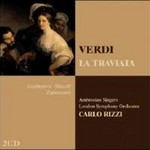
La Traviata (complete opera recorded in 1982)
 $35.00
Special Order
$35.00
Special Order3 - 6 weeks add to cart
VERDI
La Traviata (complete opera recorded in 1982)
Edita Gruberova, Neil Shicoff, Giorgio Zancanaro / London Symphony Orchestra, Carlo Rizzi (cond)
[ Teldec / Warner Classics The Opera Collection / 2 CD ]
Release Date: Monday 21 September 2009
This item is only available to us via Special Order. We should be able to get it to you in 3 - 6 weeks from when you order it.
"This is a recording to have and to turn to, especially if the opera is, you feel, being taken for granted, becoming 'part of the furniture'." (Gramophone)
"The special quality of this Traviata is clearest in its last act. The reason may be that this scene concentrates most exclusively upon the heroine, and the heroine, in the person of Edita Gruberova, seems to be responsible for most that is specially memorable throughout. Hers, I think, is the most private, internal, Violetta on record; certainly we are more than usually aware of a large part of Act 3 as extended soliloquy. The reading of the letter has no hint of a tragedienne's declamation. At the words Alfredo e in stranio suolo the speaking voice rises, but only with the emotion which the name and the sense of his distance and perhaps loneliness induce. E tardi is exclaimed loudly and to that extent conventionally, but it has an unconventional force on account of the quiet inwardness of what has gone before. The look into the mirror (Oh, come son mutata) has a disturbing actuality because of its unoperatic tone of talking-to-oneself. The longdrawn Ogni speranza e morta, as quietly sung as is humanly possible, leads into an Addio del passato where the voice is in ghostly duet with the oboe; the high notes have the frail, pallid beauty of a soul already half in the other world. After this the carnival chorus from off-stage breaks in, not as a familiar dramatic device for heightening poignancy, but as a genuinely shocking accident.
And so it goes on: because (largely) of Gruberova's very personal conception of the part, other things take on a new life. The silence between the final phrases of the duet, Parigi, o cara, become spaces in which listeners and probably the characters themselves face the negating truth. Because we listen to it as real private life, the monotoned acknowledgement pianissimo of Germont pere (Ah malcauto vegliardo! Ah, tutto il mal ch'io feci!) directs the mind, through a sudden impulse of compassion, back to the turning-point of the whole tragedy, the note held before Violetta's Dite alla giovine in Act 2 on which hangs the fate of all concerned.
In such respects this is a recording to have and to turn to, especially if the opera is, you feel, being taken for granted, becoming 'part of the furniture'. Yet in other ways it's quite ordinary. Rizzi's conducting and the LSO's playing have little to compare with the insight and delighted virtuosity that so animate the recent DG recording under Levine. Shicoff's sincerity and Zancanaro's fine voice (not that I mean to suggest the qualities are mutually exclusive) raise their performances to something rather above average, though Shicoff persists in his monotonous way of making sentences such as Io vivo quasi in ciel sound tearful. The chorus tends to be too far back, as usual, and would benefit from more imaginative production. So there we are: a strange mixture of the unremarkable and the unforgettable" (Gramophone)